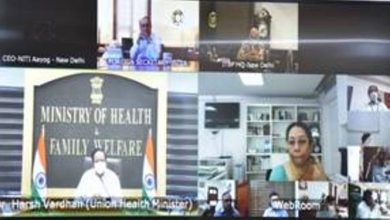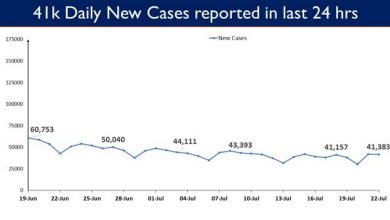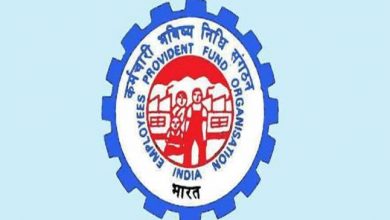Make youngsters aware of the dangers of drug abuse through special campaigns: VP Venkaiah Naidu
New Delhi: The Vice President, Shri M. Venkaiah Naidu has called for launching special campaigns to target vulnerable groups like school-college students and make them aware of the deleterious effects of drug abuse. He also wanted special attention to be paid towards youngsters from lower socio-economic strata as they were highly vulnerable and prone to various high-risk behaviours.
Speaking at an event organized by the Ministry of Social Justice and Empowerment on the International Day Against Drug Abuse & Illicit Trafficking, here today, Shri Naidu expressed concern over the worrisome trend of substance abuse and said it was estimated that globally around 275 million people (in the age group of 15- 64) used drugs at least once during 2016. Quoting WHO, he said roughly 4, 50,000 people died as a result of drug use in 2015.
Observing that those addicted to substance abuse also have to grapple with major health problems such as physical and mental disorders, illnesses, injuries, premature loss of lives and years of lives with disabilities, he opined that it would not only cast a financial burden on the family, but would also become a drain on the public exchequer and pose a major challenge to the health system.
Referring to the challenge posed by drug abuse, he said the efforts of the Governmental agencies alone would not suffice and called up on the civil society, NGOs and dedicated individuals to supplement the efforts of the government in eradicating the menace.
Observing that addiction should only be treated as an illness, Shri Naidu said that those who have turned towards substance abuse must to be counseled, rehabilitated and treated with care and affection.
“Parents and teachers should be counseled that isolation and stigmatization would only enlarge the problem and not in any way help the person addicted to substance abuse to overcome it,” he added.
The Vice President asked NGOs engaged in rehabilitation of those addicted to substance abuse to treat them humanely and enable them to become productive members of the society.
Opining that rehabilitation was crucial to wean away youngsters from addiction and make them productive by bringing them into the mainstream of the society, the Vice President urged the corporate sector to earmark funds for such activities under CSR.
The Union Minister of Social Justice and Empowerment, Shri Thaawarchand Gehlot, the Ministers of State for Social Justice and Empowerment, Shri Ramdas Athawale, Shri Krishan Pal Gurjar & Shri Rattan Lal Kataria and the Secretary, Department of Social Justice and Empowerment, Ms. Nilam Sawhney and several other dignitaries were present at the event.
Following is the text of Vice President’s address:
“आप सभी जानते हैं कि 1987 से संयुक्त राष्ट्र महासभा ने 26 जून को नशीली दवाओं के सेवन और अवैध तस्करी के खिलाफ अंतरराष्ट्रीय दिवस के रूप में मनाने का निर्णय लिया। यह दिन विश्व समुदाय को नशे की लत से मुक्त कराने के हमारे साझा संकल्प और सहयोग का प्रतीक है।
मुझे प्रसन्नता है कि सामाजिक न्याय और अधिकारिता मंत्रालय द्वारा मादक पदार्थों के सेवन, उसके भयावह परिणामों तथा उनकी अवैध तस्करी के बारे में समाज में जागरूकता फैलाने के लिए, आज यह आयोजन किया जा रहा है।
As you all are aware, the United Nations General Assembly decided to observe 26th June as the International Day against Drug Abuse and Illicit Trafficking since 1987 as an expression of its determination to strengthen action and cooperation to achieve the goal of an international society free of drug abuse.
I am happy to note that the Ministry of Social Justice and Empowerment has organized this function today with an aim to increase awareness on the dangers of drug abuse and the major problem that illicit drugs represent to society.
The menace of drug abuse is a global challenge and the developed as well as the developing nations are grappling with it.
While people of any age group can fall prey to drug abuse, teenagers and youth are particularly vulnerable to the menace. Both, the Government and the civil society have an onerous responsibility to ensure that the potential victims are made aware of the perils of drug abuse and make them remain impervious to the temptations of drugs.
It is really quite alarming to learn that some drugs are potent enough to make a person addicted even after a single use of the drug. Likewise, I am told that the abuse of therapeutic drug for intoxication is becoming a major challenge. This apart, the inhalation of harmful volatile chemicals such as adhesive solutions and erasing fluids is increasingly becoming prevalent, especially among those belonging to the lower economic strata.
The deviant behaviour of those addicted to substance abuse is a matter of serious concern to the families, society and the governments all over the world. It is estimated that globally around 275 million people (in the age group of 15-64) used drugs at least once during 2016. According to WHO, roughly 4,50,000 people died as a result of drug use in 2015. Of these, 1.67,500 deaths were drug use disorders (mainly overdoses).
In many cases, those addicted to substance abuse also have to grapple with major health problems such as physical and mental disorders, illnesses, injuries, premature loss of lives and years of lives with disabilities. It not only casts a financial burden on the family, but also becomes a drain on the public exchequer and poses a major challenge to the health systems.
As you all are aware, any intoxicating substance, whether it be alcohol or drug or volatile inhalant can lead to dependence and its harmful use can cause substantial morbidity and mortality.
Continued heavy alcohol consumption induced by addiction is found to cause early onset of heart diseases, stroke, liver cirrhosis and cancer by affecting the cardio-vascular, gastro-intestinal and immune systems of the body. Once addicted, a person may not be able to get out of the habit, even if he wants to do so, unless he is given assistance including medical treatment for de-addiction and psychological counselling. It is in this context that the Integrated Rehabilitation Centres, or IRCAs, play an important role in weaning away those addicted to substance abuse and are relevant and important.
These centres offer a variety of services and help the families in de-addiction and rehabilitation, so that the individuals could become useful members of the society. By extending financial and technical support to the IRCAs, the Ministry of Social Justice and Empowerment is discharging a great responsibility of the Government in its commitment towards a healthy and peaceful society.
I would also like to appreciate the efforts of the Ministry of Social Justice and Empowerment for conducting the National Survey on Extent and Pattern of Substance Use in 2018 to ascertain the proportion of Indian population using various substances and those affected by substance use disorders. The survey revealed some disturbing trends— about 3.1 crore individuals use cannabis products and 2.26 crore people use opioids.
Having authentic information on the extent and pattern of substance use in India is a significant first step in planning an effective strategy to address and resolve this serious social health problem in India.
बहनों और भाइयो, शुरूआत में ही इस बुरी लत की रोकथाम, इसका सबसे कारगर निदान है। हमें लोगों को, विशेषकर युवाओं को, नशे की लत का शिकार बनने से रोकना होगा। इसके लिए हमें स्कूली बच्चों, कालेज जाने वाले युवाओं, शहरी गरीबों जैसे संवेदनशील वर्गों के बीच नशे के दुष्परिणामों के प्रति जागरुकता फैलाने के लिए विशेष अभियान चलाना होगा। दुर्बल वर्ग के युवा प्राय: इस खतरे का शिकार बनते हैं – जरूरी है कि उनके लिए विशेष अभियान चलाया जाय।
शुरूआत में ही नशे की लत की रोकथाम के लिए अभिभावकों, शिक्षकों तथा छात्रों में जागरुकता बढाने पर बल दिया जाना चाहिए। अभिभावकों और शिक्षकों को यह समझना चाहिए कि बच्चे को अलग-थलग करने या उसे नीचा दिखाने से तो समस्या बढेगी। बच्चे को इस लत से बाहर निकालने के लिए संवदेनशीलता बहुत जरुरी है। नशे की आदत को एक बीमारी की तरह ही देखा जाना चाहिए और जो इस बीमारी से ग्रस्त हैं उन्हें परामर्श की आवश्यकता है, उन्हें संवेदनशीलता और स्नेह से सामान्य जीवन में वापस लौटाने की आवश्यकता है।
Dear sisters and brothers, the best solution, of course, is prevention. We need to prevent people, particularly the youngsters from falling to prey to substance abuse. There is a need to launch special campaigns targeted at vulnerable groups like school-college students to make them aware of the deleterious effects of drug abuse.
Also youngsters from lower socio-economic strata need to be targeted as they are highly vulnerable and prone to various high-risk behaviours.
To prevent addiction at an early stage, the focus has to be on sensitizing parents, teachers and of course the students. Parents and teachers should be counselled that isolation and stigmatization would only enlarge the problem and not in any way help the person addicted to substance abuse to overcome it. Addiction should be treated as an illness and those who have turned towards substance abuse need to be counselled, rehabilitated and treated with care and affection.
I would like to commend the Ministry for coming up for the first time with a National Action Plan for Drug Demand Reduction.
As mentioned earlier, the foundation needs to be laid at the stage of school education, whereby the children are made aware of the potential harm drug abuse can cause to an individual and the society at large. They should also be sensitized towards the need for preventive action and community based intervention.
I would also like to appeal to NGOs which are engaged in rehabilitation of those addicted to substance abuse to treat them humanely and enable them to become productive members of the society.
Since rehabilitation is crucial to wean away youngsters from addiction and make them productive by bringing them into the mainstream of the society, I would also urge the corporate sector to earmark funds for such activities under CSR.
I am confident the Ministry’s Action Plan would focus on providing accessible and affordable treatment services for drug addiction by ensuring IRCAs in each district as well as setting up de-addition centres in Government Hospitals.
I am told that in order to increase community participation and public cooperation in drug demand reduction, the Ministry is in the process of launching Focussed Intervention Programmes in selected districts to prevent vulnerable adolescents and youth from taking to substance abuse.
शराब और नशे की लत की यह समस्या इतनी बड़ी है कि सिर्फ सरकार या उसकी एजेंसियों के प्रयास ही पर्याप्त नहीं होंगे। इस चुनौती के समाधान के लिए NGOs तथा समर्पित व्यक्तियों, विशेषज्ञों की महत्वपूर्ण भूमिका होगी।
मुझे विश्वास है कि मादक पदार्थों के सेवन तथा अवैध तस्करी के विरूद्ध अंतरराष्ट्रीय दिवस के अवसर पर यह आयोजन इस दिशा में एक महत्वपूर्ण प्रयास सिद्ध होगा।
The magnitude of the challenge posed by drug abuse is so huge that efforts of the Governmental agencies alone will not suffice. The NGOs and other dedicated individuals also have a great responsibility in eradicating this menace.
I believe that the observance of the “International Day Against Drug Abuse and Illicit Trafficking” will go a long way in meeting this end.



